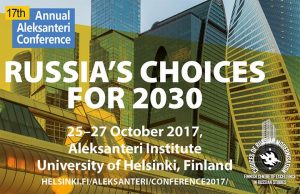17th Annual Aleksanteri Conference was organised in Helsinki on 25-27th of October by the Aleksanteri Institute, our team has taken part in several panels.
First, Daria Gritsenko and Jussi Huotari chaired the panel “Sustainable Development in the Russian Arctic: A Policy Perspective”, where Veli-Pekka Tynkkynen was the discussant. Hilma Salonen presented a paper “Strategic Energy Planning and Local Realities: Gaps and Contradictions“, and Jussi Huotari had a presentation titled “Nexus of Environmental Responsibility and Economic Development in the Corporate Strategies”.
The panel’s description on the conference website:
This panel will unite contributions that look at sustainable development (SD) in Russia through the analysis of policy interventions. Scholars have demonstrated that while sustainable development has been on the Russian policy agenda for a long time, the effective policy integration into the economic system was missing due to policy-practice gap. Recently, the rhetoric and practice of strategic planning in Russia has been consolidating, resulting in a proliferation of interlocking planning documents at all levels: from high-level strategies to detailed local programs. In this panel, we will ponder the relationship between the strategic planning and sustainable development in Russian Arctic. In particular, we will raise the following questions: How does the strong commitment to strategic planning contribute to better integration of sustainability objectives in various policy fields? How do various actors at different scales (federal, regional, local) implement strategies that account for the environment, the economy, and society? What is the role of companies, both public and private, in advancing sustainability policies in Russia? How do they ‘fit’ into SD strategies? The panel has five contributions shedding light upon the above-mentioned questions. Prof. Alexander Sergunin examines the role of the UN in encouraging academic discussions on the construction of an Arctic City Sustainable Development Index (ACSDI). His paper traces how the theoretical and methodological approaches developed in the influencial UN documents results in an academic indicator system with regard to the northern municipalities of the eight Arctic countries. Hilma Salonen focuses on the gap between local realities of peripheral Northern regions and the futures envisioned in Moscow in the field of renewable energy, especially the use of local biomass resources in heating. Her analysis of the official energy development strategies complemented with interviews with Finnish and Russian experts demonstrate how the lack of institutional, financial and technical intermediaries and reforms may turn a strategic plan into hollow promises. Alexandra Kuklina analyzes the role of the Russian Far East in constructing environmental cooperation of Asian countries in the Arctic region, with a special emphasis on joint Russian-Japanese research projects and technology transfer through building professional expert groups. Andrian Vlakhov investigates approaches to sustainability among Russian extractive companies operating in the Arctic. Based on extensive fieldwork in Svalbard, Murmansk Oblast and Republic of Karelia, he argues that the practices developed by extractive companies operating along this border are in fact a sustainable strategy of these companies. Jussi Huotari examines environmental responsibility as a part of the corporate social responsibility (CSR) in the Russian energy companies operating in oil and gas sector, in particular, how the controversies between economic development and environmental effects are presented in reports of the both parastatial companies and private corporations operating in the Russian Arctic, in particular in the Yamal-Nenets Autonomous Okrug.
Additionally, Professor Tynkkynen also chaired the panel “The Future of Russia’s North”, where Dr. Gritsenko was the discussant.

